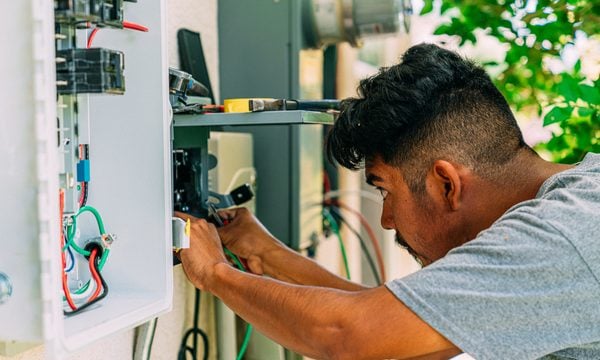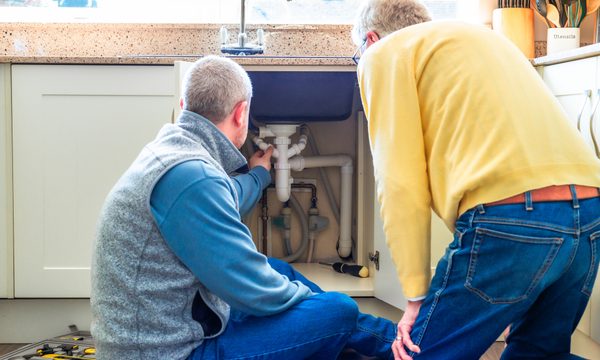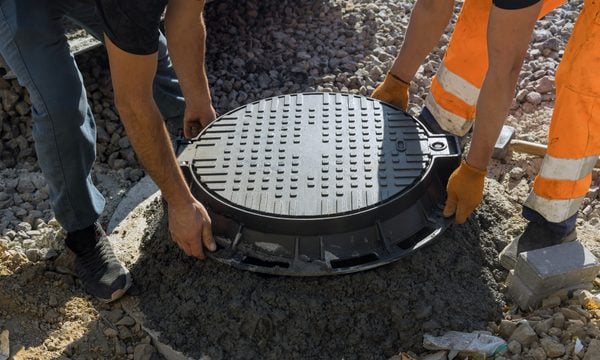Gas vs Electric Hot Water Heater: Costs, Lifespan and Energy Efficiency
Electric hot water heaters typically cost less to install and maintain, but can come with higher monthly fuel costs.

Some or all of the mortgage lenders featured on our site are advertising partners of NerdWallet, but this does not influence our evaluations, lender star ratings or the order in which lenders are listed on the page. Our opinions are our own. Here is a list of our partners.
Gas and electric water heaters differ in lifespan, energy efficiency and how quickly they can deliver more hot water, called the recovery rate.
Electric tank-style hot water heaters last longer, but cost more per month. Gas tank-style water heaters cost more to install and maintain, but may be better for large households due to their lower monthly fuel costs.
Both types of hot water heaters cost similar amounts upfront, between $550 and $1,500, including installation. Gas heaters may cost slightly more, but the most significant expense is switching from a gas to electric heater, or vice versa.
Nerdy Perspective
Consider a tankless or hybrid hot water heater for even lower monthly costs and higher energy efficiency. These models cost more than a tank-style heater, but tend to have a longer lifespan.

Deciding factors
| Gas | Electric | |
|---|---|---|
| Unit cost | $600 to $800. | $500 to $600. |
| Power source | Natural gas fuel, though some also need electricity. | Electric power. |
| Energy efficiency | Less efficient. | More efficient. |
| Maintenance costs | More costly to maintain, but lower monthly fuel costs. | Less costly to maintain, but higher monthly power costs. |
| Lifespan | 6 to 12 years. | 10 to 15 years. |
Gas hot water heaters
Gas hot water heaters typically use natural gas or propane as their fuel source. They’re best for households with high hot water usage, especially in areas that have high electricity costs.
Benefits
- High heating capacity, which allows them to “recover” quickly. For example, if multiple people in a household are showering at the same time or right after each other, a gas water heater is more likely to quickly heat water for the next shower.
- Can function in a power outage, if it’s a traditional model with a pilot light. Modern gas water heaters typically use electronics for ignition and safety functions that shut off during power outages.
- Cheaper to operate monthly, because natural gas is fairly inexpensive in many areas.
Drawbacks
- Shorter lifespan than electric heaters. Because natural gas heaters have more complex parts, maintenance and repair costs can be higher.
- Releases emissions from burning natural gas, which can be a deterrent if you prioritize eco-friendly home systems.
- Higher risk of a gas leak than other types of hot water heaters.
Electric hot water heaters
Electric hot water heaters have a lower heating capacity than gas heaters, but they’re a great choice for households with relatively low hot water usage that prioritize safety and lower maintenance costs.
Benefits
- May produce less greenhouse gas emissions, though this depends on the way electricity is produced in your area. A hot water heater powered by a solar energy power plant will be responsible for fewer emissions than one powered by a coal power plant.
- More energy-efficient than gas heaters. Electric heaters lose very little energy when heating water, because they don’t have a venting process like gas heaters do.
Drawbacks
- Lower recovery rate, meaning they take longer to heat water. Using multiple sources of hot water at once may result in a period where the system must “recover” before you have hot water again. For example, your shower may be less hot while you’re using the washing machine.
- Will not function during a power outage.
Switching water heater types
Upgrading your existing electric or gas hot water heater to a higher-capacity unit of the same type can cost just a few hundred dollars. But switching from electric to gas – or vice versa – typically comes with much higher installation costs.
Here’s what you can expect to pay to switch your hot water heater fuel source:
- Gas to electric: About $1,500. Costs can include upgrading your electrical panel and pulling a permit for an electric heater, if your city requires it.
- Electric to gas: Around $2,000. Expect costs on the higher end if you need to install a new gas line.
Advertisement



HELOC & Home Equity Loans from our partners

on FourLeaf Federal Credit Union
FourLeaf Federal Credit Union 

Min. credit score
670
Max. loan amount
$1,000,000

on Achieve
Achieve 

Min. credit score
600
Max. loan amount
$300,000

on Figure
Figure 

Min. credit score
600
Max. loan amount
$750,000
Alternative water heater types
While gas and electric hot water heaters are the most common picks, other types of hot water heaters can provide more energy efficiency and lower monthly costs.
- Tankless systems can be powered by electricity or gas and heat water on demand, rather than storing a supply of hot water. They must be correctly sized to your demand, or you won’t be able to have the hot water you need all at once.
- Hybrid heat pump water heaters draw heat from the ground or air. They’re typically 30 to 40% more expensive than tank-style models, but they’re highly energy-efficient and have a longer lifespan.
- Solar water heaters use a loop system with solar panels or solar thermal collectors to heat the water in your storage tank. They’re best for households with an existing solar energy system.
- Point-of-use heaters can be installed at a single fixture, like a shower, to provide hot water to just that fixture. They work well if you need additional hot water capacity in a specific location, but don’t require higher capacity throughout the entire house.
Article sources
NerdWallet writers are subject matter authorities who use primary,
trustworthy sources to inform their work, including peer-reviewed
studies, government websites, academic research and interviews with
industry experts. All content is fact-checked for accuracy, timeliness
and relevance. You can learn more about NerdWallet's high
standards for journalism by reading our
editorial guidelines.
More like this
Related articles








